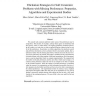4597 search results - page 916 / 920 » The Spider Model of Agents |
SIROCCO
2008
13 years 9 months ago
2008
In the effort to understand the algorithmic limitations of computing by a swarm of robots, the research has focused on the minimal capabilities that allow a problem to be solved. ...
IFIP12
2004
13 years 9 months ago
2004
With the evolution of Web service technology, services will not only become increasingly sophisticated, but also move into the area of business-to-consumer and peer-to-peer interac...
GECCO
2010
Springer
13 years 7 months ago
2010
Springer
This paper takes an economic approach to derive an evolutionary learning model based entirely on the endogenous employment of genetic operators in the service of self-interested a...
AI
2010
Springer
13 years 7 months ago
2010
Springer
We consider soft constraint problems where some of the preferences may be unspecified. This models, for example, settings where agents are distributed and have privacy issues, or ...
ARTMED
2008
13 years 7 months ago
2008
Objective: Cardiovascular disease, obesity, and lack of physical fitness are increasingly common and negatively affect people's health, requiring medical assistance and decre...

